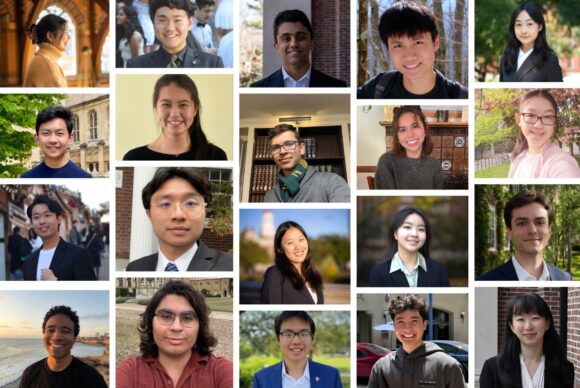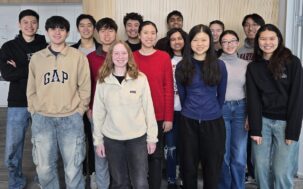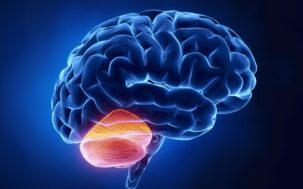Kempner Institute Welcomes Fall 2025 Undergraduate Student Researchers

Twenty Harvard undergraduate students (pictured at left) have received KURE fellowships for fall 2025. The fellowships provide funding and mentorship for research projects related to intelligence.
Cambridge, MA – The Kempner Institute for the Study of Natural and Artificial Intelligence at Harvard is pleased to announce the fall 2025 recipients of the Kempner Undergraduate Research Experience (KURE). KURE awards Harvard undergraduate students funding for term-time research supervised by Kempner-affiliated faculty during the fall and spring semesters of the academic year.
Student research projects investigate the foundations of intelligence, including mathematical and computational models of intelligence, cognitive theories of intelligence, and the neurobiological basis of intelligence, as well as applications of artificial intelligence from a scientific or engineering perspective.
Twenty Harvard undergraduate students received fall 2025 KURE awards, representing the fourth cohort of undergraduates to participate in the Kempner’s term-time undergraduate research program.
In addition to its term-time undergraduate research program, the Kempner also offers a a 10-week residential summer research program for Harvard undergraduates. The program, Kempner Research in Artificial & Natural Intelligence for Undergraduates with Mentorship (KRANIUM), is a part of the Harvard Summer Undergraduate Research Village (HSURV) and provides students with a summer living stipend, housing, and a partial boarding/dining plan, as well as access to rich social and academic programming.
To be eligible for either KURE or KRANIUM, students must find a research position with a Kempner-affiliated faculty member prior to application. More information about KURE and KRANIUM can be found on the Kempner Institute website.
The full list of fall 2025 KURE program participants, mentors and projects are listed below:
| Student | Supervisor/Mentor | Project title |
|---|---|---|
| Joseph Bejjani ’26 | Supervisor: Kianté Brantley; Mentor: Aaron Walsman | Causal Tracing of Alignment Faking in Language Models |
| Camilo Brown-Pinilla ’26 | Supervisor: Melanie Weber | Machine Translation with Language Invariant Representations |
| Ege Cakar ’27 | Supervisor: Cengiz Pehlevan; Mentor: William Tong | Do Large Language Models Learn Transferable Algorithms for Reasoning? |
| Victoria Chen ’28 | Supervisor: Ashley Thomas; Mentor: Hannah Hok Kim | What’s in a Look? Infant’s Intuitions on Collaboration and Task Performance |
| Hannah Guan ’27 | Supervisor: Yilun Du | Extending Multi-Agent Verification for Model Alignment |
| Hannah Kim ’26 | Supervisor: Binxu Wang | Diffusion Models and their Relational Compositions |
| Victoria Li ’26 | Supervisor: Martin Wattenberg | Visualization Design for AI: Probing Multi-Modal Intelligence |
| Jayson Lin ’26 | Supervisor: Yilun Du | Grounding World Models with Concept Graphs |
| Jasmine Liu ’28 | Supervisor: Xiang Li | Personalized Chronic Disease Management with Multi-Agent AI |
| Sophia Liu ’28 | Supervisor: Nada Amin; Mentor: Dat Thanh Nguyen | Policy Iteration for Tool Orchestration with Large Language Models in Biomedical Systems |
| Simon Ma ’26 | Supervisor: Naomi Saphra | Quantifying demographic bias in Large Language Model responses using TF-IDF analysis and clustering techniques |
| Emmanuel Rassou ’27 | Supervisor: Kianté Brantley | When to Reset to Climb Higher in Reinforcement Learning |
| Itzel Sanchez ’26 | Supervisor: Ilenna Jones | Dendritic Correlates of Gradient-Based Learning in Neural Credit Assignment |
| Neil Shah ’26 | Supervisor: Wilka Carvalho | Investigating Multi-Agent Coordination When Continually Learning Millions of Tasks |
| Vincent Song ’28 | Supervisor: Samuel Gershman; Mentors: Christopher Bates, Kazuki Irie | Meta-Learning for In-Context Program Induction |
| Johnathan Sun ’26 | Supervisor: Martin Wattenberg | Causal Mechanisms and Optimization of AI Data Understanding |
| Ashley Zheng ’28 | Supervisor: Bernardo L. Sabatini; Mentor: Shun Li | Neuro-Inspired Reinforcement Learning: Sign-Switching Plasticity and PID Control |
| Kaden Zheng ’27 | Supervisor: Naomi Saphra | Sequence Modeling of Electrocommunication in Mormyrid Elephantfish |
| Todd Zhou ’27 | Supervisor: Mengyu Wang | Nonlinear Rectified Flows for AI Image Generation |
| Richard Zhu ’26 | Supervisor: Marinka Zitnik | Diffusion-based molecular generation using universal embeddings of intermolecular interactions |
About the Kempner Institute
The Kempner Institute seeks to understand the basis of intelligence in natural and artificial systems by recruiting and training future generations of researchers to study intelligence from biological, cognitive, engineering, and computational perspectives. Its bold premise is that the fields of natural and artificial intelligence are intimately interconnected; the next generation of artificial intelligence (AI) will require the same principles that our brains use for fast, flexible natural reasoning, and understanding how our brains compute and reason can be elucidated by theories developed for AI. Join the Kempner mailing list to learn more, and to receive updates and news.
PRESS CONTACT:
Deborah Apsel Lang | kempnercommunications@harvard.edu






